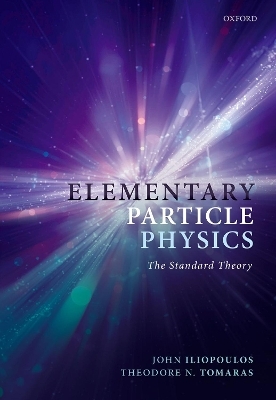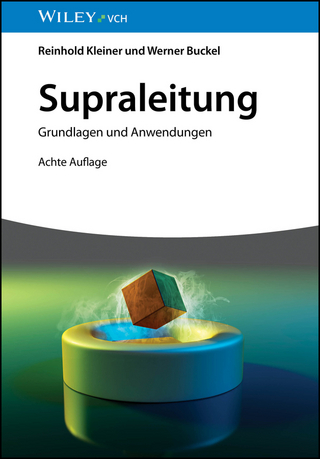
Elementary Particle Physics
Oxford University Press (Verlag)
978-0-19-284421-7 (ISBN)
Since the development of natural philosophy in Ancient Greece, scientists have been concerned with determining the nature of matter's smallest constituents and the interactions among them. This textbook examines the question of the microscopic composition of matter through an accessible introduction to what is now called 'The Physics of Elementary Particles'.
In the last few decades, elementary particle physics has undergone a period of transition, culminating in the formulation of a new theoretical scheme, known as 'The Standard Model', which has profoundly changed our understanding of nature's fundamental forces. Rooted in the experimental tradition, this new vision is based on geometry and sees the composition of matter in terms of its accordance with certain geometrical principles.
This textbook presents and explains this modern viewpoint to a readership of well-motivated undergraduate students, by guiding the reader from the basics to the more advanced concepts of Gauge Symmetry, Quantum Field Theory and the phenomenon of spontaneous symmetry breaking through concrete physical examples.
This engaging introduction to the theoretical advances and experimental discoveries of the last decades makes this fascinating subject accessible to undergraduate students and aims at motivating them to study it further.
John Iliopoulos is a Director of Research Emeritus at the École Normale Supérieure in Paris. He has taught on many introductory courses in Theoretical Physics, including Quantum Field Theory and the Theory of Elementary Particles, at the École Normale Supérieure and the École Polytechnique as well as in various Schools and Universities. In 1970, in collaboration with Sheldon Glashow and Luciano Maiani, he predicted the existence of the charm quark and proposed the GIM mechanism, an important step in the construction of the Standard Model. He also contributed to the development of supersymmetry, with Bruno Zumino and Pierre Fayet. He has received many awards, including the Ricard Prize of the French Physical Society, the Sakurai Prize of the American Physical Society, the High Energy Physics Prize of the European Physical Society and the Dirac Medal. Following his PhD at Harvard University, Theodore Tomaras worked as research associate at CalTech and junior faculty at Rockefeller University, before joining the University of Crete, Greece, where he is now Professor of Physics Emeritus. He has taught many undergraduate and postgraduate courses, on elementary particle physics, quantum field theory, and gravitation and cosmology. He has contributed to the study of magnetic monopoles in GUT models, to the physics beyond the Standard Model, to the study of solitons in High Energy and Condensed Matter Physics, and to astroparticle physics. He has served as Head of the Department of Physics and of the Institute of Theoretical and Computational Physics of the University of Crete for several years, and was recently honoured with the 'S. Pihorides Award for Exceptional University Teaching'.
1: Introduction
2: Quantisation of the Electromagnetic Field and Spontaneous Photon Emission
3: Elements of Classical Field Theory
4: Scattering in Classical and Quantum Physics
5: Elements of Group Theory
6: Particle Physics Phenomenology
7: Relativistic Wave Equations
8: Towards a Relativistic Quantum Mechanics
9: From Classical to Quantum Mechanics
10: From Classical to Quantum Fields: Free Fields
11: Interacting Fields
12: Scattering in Quantum Field Theory
13: Gauge Interactions
14: Spontaneously Broken Symmetries
15: The Principles of Renormalisation
16: The Electromagnetic Interactions
17: Infrared Effects
18: The Weak Interactions
19: A Gauge Theory for the Weak and Electromagnetic Interactions
20: Neutrino Physics
21: The Strong Interactions
22: The Standard Model and Experiment
23: Beyond the Standard Model
Free
| Erscheinungsdatum | 29.12.2021 |
|---|---|
| Zusatzinfo | 112 line drawing and colour halftones |
| Verlagsort | Oxford |
| Sprache | englisch |
| Maße | 171 x 245 mm |
| Gewicht | 992 g |
| Themenwelt | Naturwissenschaften ► Physik / Astronomie ► Atom- / Kern- / Molekularphysik |
| Naturwissenschaften ► Physik / Astronomie ► Hochenergiephysik / Teilchenphysik | |
| Naturwissenschaften ► Physik / Astronomie ► Quantenphysik | |
| ISBN-10 | 0-19-284421-0 / 0192844210 |
| ISBN-13 | 978-0-19-284421-7 / 9780192844217 |
| Zustand | Neuware |
| Haben Sie eine Frage zum Produkt? |
aus dem Bereich


